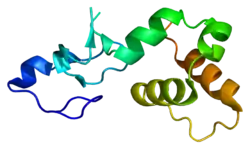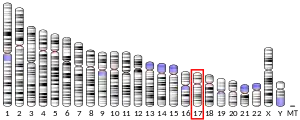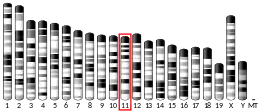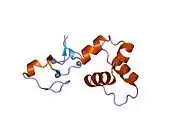RFFL
E3 ubiquitin-protein ligase rififylin is an enzyme that in humans is encoded by the RFFL gene.[5][6]
References
- GRCh38: Ensembl release 89: ENSG00000092871 - Ensembl, May 2017
- GRCm38: Ensembl release 89: ENSMUSG00000020696 - Ensembl, May 2017
- "Human PubMed Reference:". National Center for Biotechnology Information, U.S. National Library of Medicine.
- "Mouse PubMed Reference:". National Center for Biotechnology Information, U.S. National Library of Medicine.
- Coumailleau F, Das V, Alcover A, Raposo G, Vandormael-Pournin S, Le Bras S, Baldacci P, Dautry-Varsat A, Babinet C, Cohen-Tannoudji M (Sep 2004). "Over-Expression of Rififylin, a New RING Finger and FYVE-like Domain-containing Protein, Inhibits Recycling from the Endocytic Recycling Compartment". Mol Biol Cell. 15 (10): 4444–56. doi:10.1091/mbc.E04-04-0274. PMC 519139. PMID 15229288.
- "Entrez Gene: RFFL ring finger and FYVE-like domain containing 1".
Further reading
- Tibbetts MD, Shiozaki EN, Gu L, et al. (2005). "Crystal structure of a FYVE-type zinc finger domain from the caspase regulator CARP2". Structure. 12 (12): 2257–63. doi:10.1016/j.str.2004.10.007. PMID 15576038.
- Gerhard DS, Wagner L, Feingold EA, et al. (2004). "The Status, Quality, and Expansion of the NIH Full-Length cDNA Project: The Mammalian Gene Collection (MGC)". Genome Res. 14 (10B): 2121–7. doi:10.1101/gr.2596504. PMC 528928. PMID 15489334.
- Beausoleil SA, Jedrychowski M, Schwartz D, et al. (2004). "Large-scale characterization of HeLa cell nuclear phosphoproteins". Proc. Natl. Acad. Sci. U.S.A. 101 (33): 12130–5. Bibcode:2004PNAS..10112130B. doi:10.1073/pnas.0404720101. PMC 514446. PMID 15302935.
- McDonald ER, El-Deiry WS (2004). "Suppression of caspase-8- and -10-associated RING proteins results in sensitization to death ligands and inhibition of tumor cell growth". Proc. Natl. Acad. Sci. U.S.A. 101 (16): 6170–5. Bibcode:2004PNAS..101.6170M. doi:10.1073/pnas.0307459101. PMC 395941. PMID 15069192.
- Ota T, Suzuki Y, Nishikawa T, et al. (2004). "Complete sequencing and characterization of 21,243 full-length human cDNAs". Nat. Genet. 36 (1): 40–5. doi:10.1038/ng1285. PMID 14702039.
- Strausberg RL, Feingold EA, Grouse LH, et al. (2003). "Generation and initial analysis of more than 15,000 full-length human and mouse cDNA sequences". Proc. Natl. Acad. Sci. U.S.A. 99 (26): 16899–903. Bibcode:2002PNAS...9916899M. doi:10.1073/pnas.242603899. PMC 139241. PMID 12477932.
This article is issued from Wikipedia. The text is licensed under Creative Commons - Attribution - Sharealike. Additional terms may apply for the media files.





